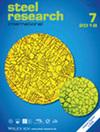Influence of Zr and Ti on MnS Inclusions, Microstructure, and Mechanical Properties of F38MnVS6 Steel
IF 1.9
3区 材料科学
Q2 METALLURGY & METALLURGICAL ENGINEERING
引用次数: 0
Abstract
The influence of Zr and Ti on the inclusions, microstructure, and mechanical properties of three sets of steel prepared using a vacuum induction melting furnace is analyzed. In steel without Zr and Ti, MnS is mainly distributed in the grain boundary with a rod‐like or dendritic morphology, an average diameter of 10 μm, and a quantity of 2.08 × 10Zr 和 Ti 对 F38MnVS6 钢中 MnS 杂质、微观结构和机械性能的影响
分析了 Zr 和 Ti 对使用真空感应熔炼炉制备的三组钢的夹杂物、微观结构和机械性能的影响。在不含 Zr 和 Ti 的钢中,MnS 主要分布在晶界中,呈棒状或树枝状形态,平均直径为 10 μm,数量为 2.08 × 104 m-3。与 Zr 和 Ti 合金后,钢中的 MnS 分布均匀,呈块状或球状形态,平均直径为 7.2 μm,数量为 11.01 × 104 m-3。钢中的氧含量对 MnS 形态没有显著影响。钢中形成的 ZrO2 和 Ti2ZrO6 与 MnS 有轻微的晶格偏析。在凝固过程中,MnS 很容易析出,形成以氧化物为核心的 I 型和 III 型 MnS。MnS 复合材料在锻造过程中表现出显著的抗变形能力。添加 Zr 和 Ti 增加了钢中晶粒内铁素体的比例,减小了珠光体薄片间距和平均晶粒尺寸,使室温下的屈服强度从 745 兆帕增加到 820 兆帕,冲击能从 21 焦耳增加到 56 焦耳。总之,添加 Zr 和 Ti 能显著改善钢的机械性能。
本文章由计算机程序翻译,如有差异,请以英文原文为准。
求助全文
约1分钟内获得全文
求助全文
来源期刊

steel research international
工程技术-冶金工程
CiteScore
3.30
自引率
18.20%
发文量
319
审稿时长
1.9 months
期刊介绍:
steel research international is a journal providing a forum for the publication of high-quality manuscripts in areas ranging from process metallurgy and metal forming to materials engineering as well as process control and testing. The emphasis is on steel and on materials involved in steelmaking and the processing of steel, such as refractories and slags.
steel research international welcomes manuscripts describing basic scientific research as well as industrial research. The journal received a further increased, record-high Impact Factor of 1.522 (2018 Journal Impact Factor, Journal Citation Reports (Clarivate Analytics, 2019)).
The journal was formerly well known as "Archiv für das Eisenhüttenwesen" and "steel research"; with effect from January 1, 2006, the former "Scandinavian Journal of Metallurgy" merged with Steel Research International.
Hot Topics:
-Steels for Automotive Applications
-High-strength Steels
-Sustainable steelmaking
-Interstitially Alloyed Steels
-Electromagnetic Processing of Metals
-High Speed Forming
 求助内容:
求助内容: 应助结果提醒方式:
应助结果提醒方式:


